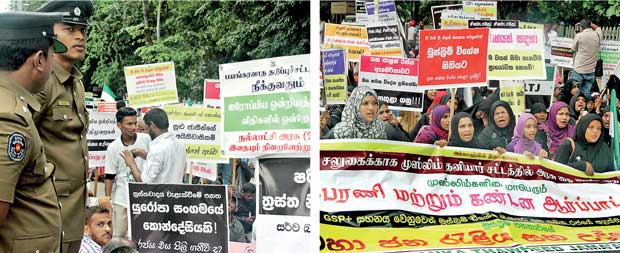Reply To:
Name - Reply Comment
Last Updated : 2024-04-25 21:49:00

 A hilarious debate on the Muslim Personal Law or particularly the Muslim Marriages and Divorce Act (MMDA) is ongoing on social media between certain Muslim and non-Muslim groups. It is indeed hilarious because the contending parties have no basic difference of opinion, but they keep shouting at the top of their voices.
A hilarious debate on the Muslim Personal Law or particularly the Muslim Marriages and Divorce Act (MMDA) is ongoing on social media between certain Muslim and non-Muslim groups. It is indeed hilarious because the contending parties have no basic difference of opinion, but they keep shouting at the top of their voices.
The bone of contention is whether the MMDA should be amended. Several individuals and groups press for the amendment of the Act, arguing that some of its provisions such as the minimum age limit for a girl to enter wedlock - which is 12 - violate human rights. On the other hand, the Muslim community has also initiated measures to amend the Act including the said provision for the past several years. Yet, both parties throw tantrums at each other.
The controversy this time triggered after Law and Order Minister Sagala Ratnayake, in response to a question over a move by the government to amend the MMDA, said at a media briefing that the country had to obey international conventions to get the Generalised Scheme of Preferences (GSP)-Plus facility from the European Union (EU).
Muslim groups including those who advocate the changes in MMDA, such as the Muslim Council of Sri Lanka (MCSL) and the All Ceylon Jamiyyathul Ulama (ACJU), criticised the government’s stance saying it was needlessly submitting to international pressure. The ACJU, the Muslim theologians’ council in Sri Lanka, in a statement last week said: “though there is no difference of opinion to bring certain changes according to the present situation… it strongly opposes bringing changes in the Muslim Personal Law, either due to international pressures or stimulation of any evil forces acting against the Muslims.”
MCSL President N. M. Ameen had told the Sunday Times last week: “there is certainly a need to amend the MMDA, but this has to be done in consultation with the Muslim religious leadership and the Muslim community in Sri Lanka, and not at the dictates of the EU or international community.”
However, the EU has not directly called upon the government to amend the MMDA, nor did its 15 conditions put forward when the GSP-Plus facility was suspended in 2010 include anything of the sort, except to say Sri Lanka should adhere to international human rights conventions, which can be connected to the said minimum age limit in the MMDA. Nonetheless, the MMDA was in operation in its present form when Sri Lanka was enjoying the GSP facility and the EU never had an issue with it then.
Besides, addressing a news briefing, the European Union (EU) Ambassador to Sri Lanka Tung-Lai Margue with the visiting four-member delegation of the European Parliament (EP) days ago had noted that the ongoing discussion on the marriage law in the country was purely domestic and EU had no role to play in it.
“There are a number of international conventions that Sri Lanka has agreed to comply with; one of them is the International Convention of Protection of Children, which clearly indicates not to allow marriages below the age of 16. Apart from that, we are not going to be part of the discussion on how Sri Lanka is going to do that or the current debate,” Ambassador Margue had pointed out.
The current debate on the Muslim Personal Law could be attributed to the misgivings prevailing among Muslims and non-Muslims as well as those with vested interests who want to thrive on social tensions. In fact, the MMDA and its practice by Muslims is a highly-misunderstood phenomenon. For instance, it has been portrayed as if marrying a girl at the age of 12 is a widely prevalent practice among Muslims in Sri Lanka as the law permits them to do so. But the reality is that marriages at the age of 12 are not something heard of in the country.
Only a small percentage of Muslim girls are getting married at the age of 14 or 15 in certain remote areas in the Eastern and North-western Provinces where child marriages are an issue among other communities as well. Other Muslim parents opt for a more mature age. Educated Muslim families go even beyond the general statutory age limit of 18. Hence, child marriages in Sri Lanka have nothing to do with the MMDA, but are an economic issue which the EU can assist Sri Lanka to address. And also the situation in those remote areas points to the fact that laws alone cannot contain child marriages.
The MMDA spells out indirectly the minimum age limit -12 years - for Muslim girls to enter wedlock. However, marriage at that age is not a recommendation by the law, but only a permission. With the increasing trend among Muslim girls to take to education and higher education the tendency for early marriage is also gradually declining. There is a growing agreement among the Muslims to stipulate a higher minimum age limit, probably 16, for their girls for matrimony, as it does not conflict with the current general practice among the Muslims.
Muslim parents, as other parents do, are aware that their daughters are not psychologically prepared to take the responsibility of a family even at the age of 16 or 17, especially under the present social context. Also, many parents now prefer their daughters to go for higher education. However, they are not in a position to decide on the future of their children in isolation, as there is a fear among them as to whether there would be any demand for their daughters in the “marriage market” after the age of 22 or 23, depending on the local situations. Thus, many parents allow the local tradition to take its course. These things cannot be decided by the EU or by its tariff concessions.
Various Muslim groups themselves had pointed out several other flaws in the MMDA. For instance, the Muslim Women’s Research and Action Forum (MWRAF), an NGO working for the rights of Muslim women, had pointed out that though the MMDA recognised that the consent of both parties was essential for a valid marriage, there was no space in the marriage register for the signature of the bride. The group had stressed the need to amend the Muslim Marriage Register so as to allow brides to sign it.
The MMDA allows polygamy as in Islam which permits to marry more than one wife on the strict condition of equality and justice among the wives. The MWRAF notes that the present law does not impose an obligation on the Quazi to find out whether the husband is in fact able to treat all his wives equally and justly. However, bigamy, leave alone polygamy is also a rare practice now among Sri Lankan Muslims.
The Muslim marriage law in Sri Lanka recognises dowry, which is legally described as ‘kaikuli’. Calling this provision un-Islamic, the MWRAF says this concept has reduced Muslim marriages to a transaction between buyer and seller, and places a heavy financial burden on the bride’s family. Parents of many Muslim women have got into lifelong debt to find kaikuli for their daughters.
Hence, the Muslim community is not ignorant of these flaws in the law or adamant in rectifying the situation. A committee headed by former Supreme Court Judge Saleem Marsoof has been working for the past several years to make recommendations to reform the MMDA. Therefore, the attempt to use the GSP-Plus or any other cudgel to force the government or the Muslim community to do it is irrational and tantamount to an attempt to ‘re-invent the wheel.’

Add comment
Comments will be edited (grammar, spelling and slang) and authorized at the discretion of Daily Mirror online. The website also has the right not to publish selected comments.
Reply To:
Name - Reply Comment
US authorities are currently reviewing the manifest of every cargo aboard MV
On March 26, a couple arriving from Thailand was arrested with 88 live animal
According to villagers from Naula-Moragolla out of 105 families 80 can afford
Is the situation in Sri Lanka so grim that locals harbour hope that they coul